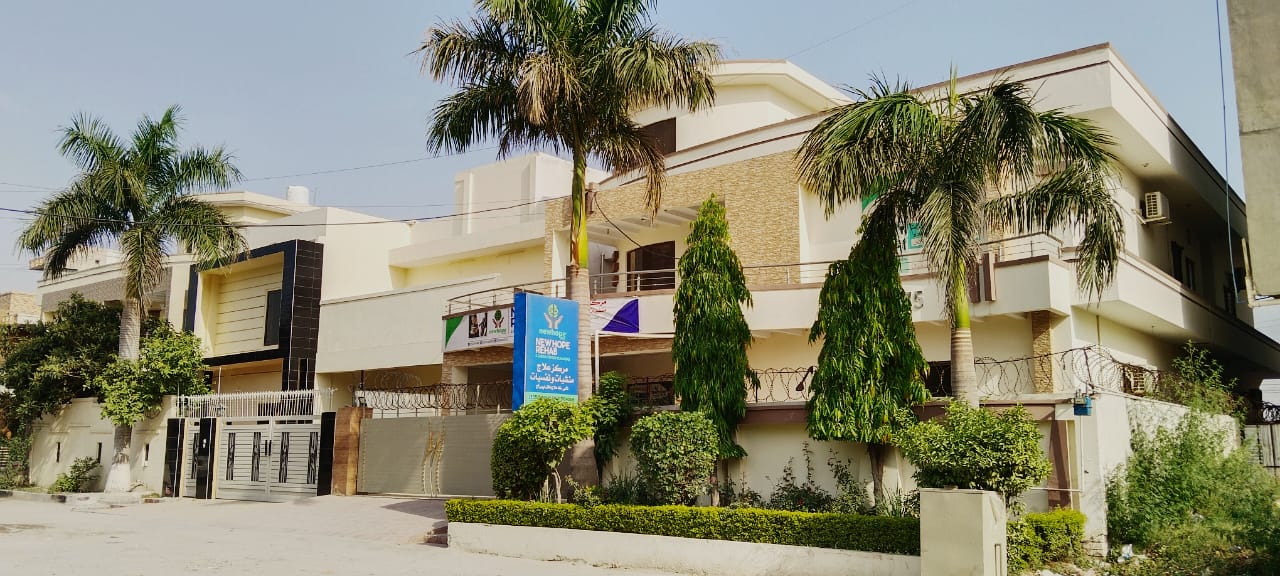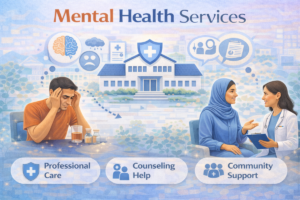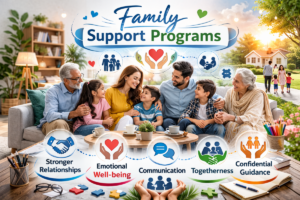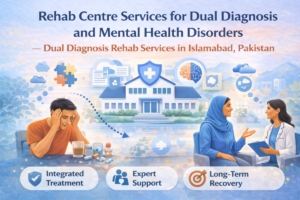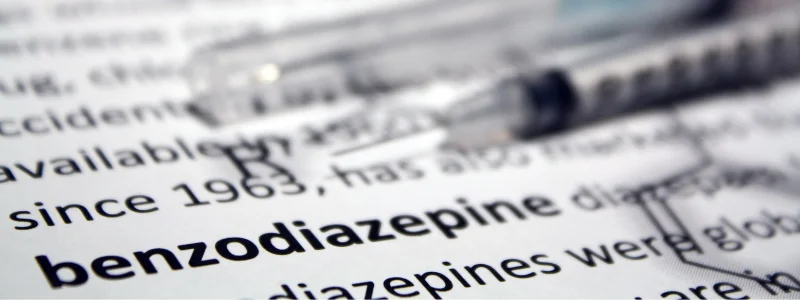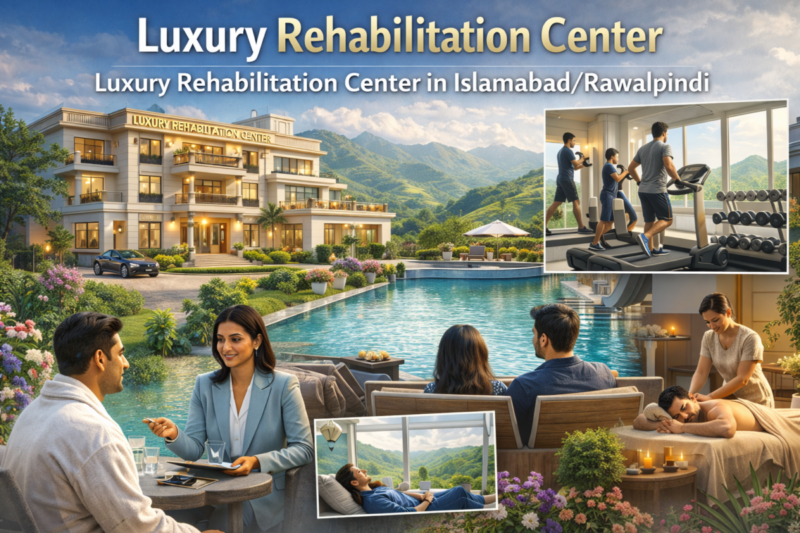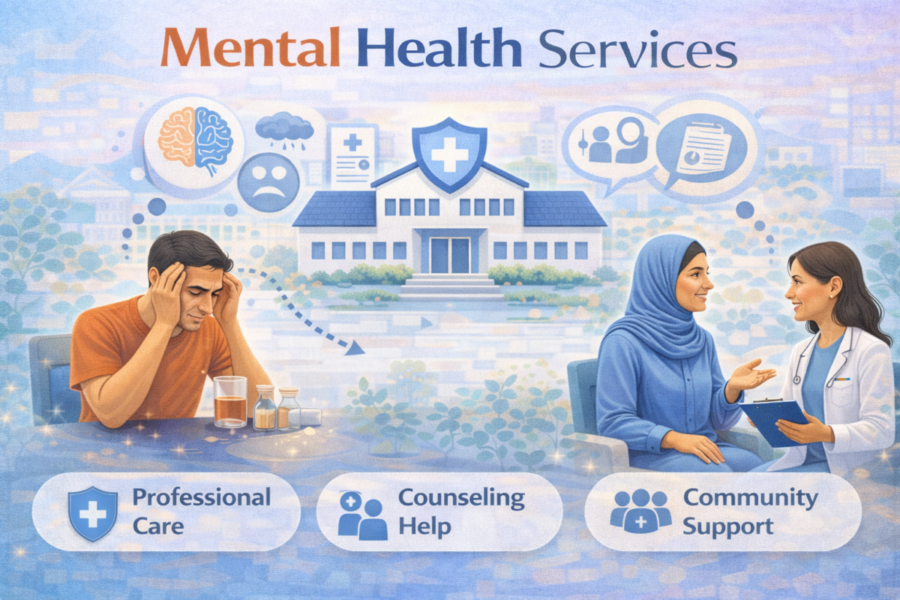Drug Rehabilitation Centre in Azad Kashmir, Pakistan
Drug addiction and alcoholism are two major problems that are faced by many people today. This blog post will discuss how New Hope Rehab Centre helps people in the Kashmir region of Pakistan, with these problems. New Hope Rehab Centre is an organization providing drug addiction and alcoholism treatment. We’re aiming to provide the rehab it takes to break addiction. This blog will give you insight on how they help people with these habits and what the treatments entail, particularly in the Kashmir area of Pakistan.
Situation of Drug Addiction in Azad Kashmir, Pakistan
Drug addiction is more prevalent in the Kashmir of Pakistan because of the lack of support from the government. There is a dearth of government support for drug addiction in the Kashmir of Pakistan. There is a social stigma surrounding drug addiction, which makes people reluctant to publicly acknowledge the problem. There is also a lack of awareness about drug addiction in the Kashmir of Pakistan. People in this region are unaware of their government’s programs to combat drug addiction. They also have no knowledge of available resources to help them deal with their addiction. This lack of government support makes dealing with drug addiction more difficult.
Opioid addiction is a serious health concern in Azad Kashmir of Pakistan due to proximity with neighbouring areas and economic downturn. That country has the highest rate of opioid addiction in the world. This is primarily due to easy access to opioids via medical prescriptions. Opioid addiction is also a major factor in the country’s growing crime rate and social unrest. To address this crisis, the government must establish effective policies to combat drug abuse. Kashmir has a high incidence of drug addiction due to the lack of proper support and healthcare infrastructure, limited educational opportunities, and a lack of income. In addition, there is a dearth of government support for drug addiction in the Kashmir of Pakistan. There is a social stigma surrounding drug addiction, which makes people reluctant to publicly acknowledge the problem. There is also a lack of awareness about drug addiction in the Kashmir of Pakistan. People in this region are unaware of their government’s programs to combat drug addiction. They also have no knowledge of available resources to help them deal with their addiction. This lack of government support makes dealing with drug addiction more difficult.
Best Centres for Drug Addiction Rehab in Kashmir
According to the Associated Press , addiction rates are rapidly increasing in Pakistan, with 1 million people suffering from an opioid addiction. In response, the government has plans to establish a national addiction treatment centre. Religious and spiritual practices are used to treat drug abuse, but these practices are not sufficient on their own. Treatments such as motivational speaking, counselling and medication are needed to effectively treat drug dependency. Countries such as Iran have successfully treated drug addictions with these methods; it’s time for Pakistan to learn from their model! In this regard, rehab centres play a vital role in recovery from drug and alcohol addictions. The top most beneficial institute among them is New Hope Rehab Centre with multiple locations in Kashmir and Islamabad, Pakistan.
New Hope Rehab Centre Facilities for Patients
New Hope Rehab provides facilities to the patients for Drug addiction, which is a serious public health problem. According to the World Health Organisation, there were 172 million drug users in the year 2000. The number of drug users has increased dramatically in recent years, which has strained many rehabilitation centres to accommodate them. Situation is so bad that some nations have considered legalising recreational drugs to reduce the number of drug addicts and increase the availability of treatment for them. However, the debate on this issue is still ongoing. New Hope Rehabilitation centres provide help and support to recovering drug addicts so they can lead stable and happy lives.
New Hope Rehab Centre in Kashmir, offers various methods for dealing with the psychological issues of drug addiction. Drug addicts usually experience a range of emotions when using drugs, such as anxiety, depression, loneliness, boredom and anger. To treat these psychological issues, rehabilitation centres use methods like cognitive behavioural therapy (CBT) or mindfulness meditation that help patients manage their negative thoughts while abstaining from drugs. They also encourage patients to attend group therapy sessions led by trained counsellors that address their issues together as a group. Groups are especially useful when treating severe addictions since it’s difficult for patients to focus during one-on-one counselling sessions alone without getting distracted by their own thoughts and emotions first.
New Hope Rehab Centre facilities cater to recovering drug addicts with modern facilities, education methods and physical exercise regimes designed to prevent relapsing into addiction once more successful treatment is complete. It takes time and dedication for rehab centre staff members working closely with addicted patients daily for several years until most recovering addicts find stable mental health after treatment is complete!
Relapse Prevention
Complete Treatment, Family Support and Regular Evaluation is Vital
Family support is vital for helping drug addicts learn from their mistakes and turn their lives around. Family members are able to provide emotional support and a safe environment for addicts to live in during recovery. They can also help addicts by providing advice and guidance. This support is invaluable for helping addicts avoid making the same mistakes when they are not around. At New Hope Rehab Centre, through our Family Training Program, we ensure that Family members are also able to prevent addicts from leaving their homes when they are not there. This support helps drug addicts avoid becoming homeless and desperate, which is dangerous for their recovery.
Some family members may resent addicts for disrupting their lives. When a drug addict patient is in recovery, he may be a problem for the family because he is not able to function normally. Some family members may be frustrated by the constant interference from their loved one and may want them to leave.
It can be difficult for family members to provide support for addicts when they don’t understand addiction. They may not realise the impact that their words and actions have on their loved ones. This can lead to them unintentionally undermining their loved one’s recovery. By doing so, they are not providing the emotional support that they need.
Family members provide the emotional support that is necessary for the overall health of the drug addict patient and the rest of the family. They should focus on the training provided by the rehab centre to prevent patients from relapsing and staying sober forever. Continued psych evaluation sessions are vital in this regard. In order to avoid relapse and increase the chances of success ratio the program must be adopted completely and should never be left incomplete and inconsistently. Patients should continue their session assessment and get Psych evaluation for future advice and progress.
Continued Treatment and Counselling from New Hope Rehab Centre
New Hope Rehab Centre focuses on helping drug addiction patients not just get rid of drug and alcohol addiction but also maintain sobriety for complete recovery. We are a rehabilitation centre that offers inpatient, outpatient, and day treatment programs.
We also offer a full range of aftercare services.Despite so many people fighting addiction, it never stays away. There are always people who are going to quit, but many others will fight to get back on the right track again. Fortunately, there are organisations like New Hope Rehab Centre that can help you.
New Hope offers drug addiction treatment programs, while also providing social and spiritual support services. They are a safe haven for individuals who want to beat drug addiction. This blog explained how New Hope can help drug addiction patients get rid of drug and alcohol addiction habits.
New Hope is able to help people that have gone through traditional treatment methods, but have failed or are simply looking for a different way to help their addiction. They offer holistic treatment methods and programs, which is why they are considered a highly unique and effective treatment centre with a great success ratio.
Psychiatric and Drug Addiction Emergencies
Reach our customer service by calling the numbers below for any type of drug addiction and psychiatric emergencies, patient pickup and ambulance service is also arranged by the staff of New Hope Rehab Centre. Happy Healthy Living for All.
Drug Rehabilitation Centre in Azad Kashmir, Pakistan
Kashmir Rehab Centre
Drug addiction and alcoholism are two major problems that are faced by many people today. This blog post will discuss how New Hope Rehab Centre helps people in the Kashmir region of Pakistan, with these problems. New Hope Rehab Centre is an organisation providing drug addiction and alcoholism treatment. We’re aiming to provide the rehab it takes to break addiction. This blog will give you insight on how they help people with these habits and what the treatments entail, particularly in the Kashmir area of Pakistan.
Situation of Drug Addiction in Azad Kashmir, Pakistan
Drug addiction is more prevalent in the Kashmir of Pakistan because of the lack of support from the government. There is a dearth of government support for drug addiction in the Kashmir of Pakistan. There is a social stigma surrounding drug addiction, which makes people reluctant to publicly acknowledge the problem. There is also a lack of awareness about drug addiction in the Kashmir of Pakistan. People in this region are unaware of their government’s programs to combat drug addiction. They also have no knowledge of available resources to help them deal with their addiction. This lack of government support makes dealing with drug addiction more difficult.
Opioid addiction is a serious health concern in Azad Kashmir of Pakistan due to proximity with neighbouring areas and economic downturn. That country has the highest rate of opioid addiction in the world. This is primarily due to easy access to opioids via medical prescriptions. Opioid addiction is also a major factor in the country’s growing crime rate and social unrest. To address this crisis, the government must establish effective policies to combat drug abuse. Kashmir has a high incidence of drug addiction due to the lack of proper support and healthcare infrastructure, limited educational opportunities, and a lack of income. In addition, there is a dearth of government support for drug addiction in the Kashmir of Pakistan. There is a social stigma surrounding drug addiction, which makes people reluctant to publicly acknowledge the problem. There is also a lack of awareness about drug addiction in the Kashmir of Pakistan. People in this region are unaware of their government’s programs to combat drug addiction. They also have no knowledge of available resources to help them deal with their addiction. This lack of government support makes dealing with drug addiction more difficult.
Best Centres for Drug Addiction Rehab in Kashmir
According to the Associated Press , addiction rates are rapidly increasing in Pakistan, with 1 million people suffering from an opioid addiction. In response, the government has plans to establish a national addiction treatment centre. Religious and spiritual practices are used to treat drug abuse, but these practices are not sufficient on their own. Treatments such as motivational speaking, counselling and medication are needed to effectively treat drug dependency. Countries such as Iran have successfully treated drug addictions with these methods; it’s time for Pakistan to learn from their model! In this regard, rehab centres play a vital role in recovery from drug and alcohol addictions. The top most beneficial institute among them is New Hope Rehab Centre with multiple locations in Kashmir and Islamabad, Pakistan.
New Hope Rehab Centre Facilities for Patients
New Hope Rehab provides facilities to the patients for Drug addiction, which is a serious public health problem. According to the World Health Organisation, there were 172 million drug users in the year 2000. The number of drug users has increased dramatically in recent years, which has strained many rehabilitation centres to accommodate them. Situation is so bad that some nations have considered legalising recreational drugs to reduce the number of drug addicts and increase the availability of treatment for them. However, the debate on this issue is still ongoing. New Hope Rehabilitation centres provide help and support to recovering drug addicts so they can lead stable and happy lives.
New Hope Rehab Centre in Kashmir, offers various methods for dealing with the psychological issues of drug addiction. Drug addicts usually experience a range of emotions when using drugs, such as anxiety, depression, loneliness, boredom and anger. To treat these psychological issues, rehabilitation centres use methods like cognitive behavioural therapy (CBT) or mindfulness meditation that help patients manage their negative thoughts while abstaining from drugs. They also encourage patients to attend group therapy sessions led by trained counsellors that address their issues together as a group. Groups are especially useful when treating severe addictions since it’s difficult for patients to focus during one-on-one counselling sessions alone without getting distracted by their own thoughts and emotions first.
New Hope Rehab Centre facilities cater to recovering drug addicts with modern facilities, education methods and physical exercise regimes designed to prevent relapsing into addiction once more successful treatment is complete. It takes time and dedication for rehab centre staff members working closely with addicted patients daily for several years until most recovering addicts find stable mental health after treatment is complete!
Relapse Prevention
Complete Treatment, Family Support and Regular Evaluation is Vital
Family support is vital for helping drug addicts learn from their mistakes and turn their lives around. Family members are able to provide emotional support and a safe environment for addicts to live in during recovery. They can also help addicts by providing advice and guidance. This support is invaluable for helping addicts avoid making the same mistakes when they are not around. At New Hope Rehab Centre, through our Family Training Program, we ensure that Family members are also able to prevent addicts from leaving their homes when they are not there. This support helps drug addicts avoid becoming homeless and desperate, which is dangerous for their recovery.
Some family members may resent addicts for disrupting their lives. When a drug addict patient is in recovery, he may be a problem for the family because he is not able to function normally. Some family members may be frustrated by the constant interference from their loved one and may want them to leave.
It can be difficult for family members to provide support for addicts when they don’t understand addiction. They may not realise the impact that their words and actions have on their loved ones. This can lead to them unintentionally undermining their loved one’s recovery. By doing so, they are not providing the emotional support that they need.
Family members provide the emotional support that is necessary for the overall health of the drug addict patient and the rest of the family. They should focus on the training provided by the rehab centre to prevent patients from relapsing and staying sober forever. Continued psych evaluation sessions are vital in this regard. In order to avoid relapse and increase the chances of success ratio the program must be adopted completely and should never be left incomplete and inconsistently. Patients should continue their session assessment and get Psych evaluation for future advice and progress.
Continued Treatment and Counselling from New Hope Rehab Centre
New Hope Rehab Centre focuses on helping drug addiction patients not just get rid of drug and alcohol addiction but also maintain sobriety for complete recovery. We are a rehabilitation centre that offers inpatient, outpatient, and day treatment programs.
We also offer a full range of aftercare services. Despite so many people fighting addiction, it never stays away. There are always people who are going to quit, but many others will fight to get back on the right track again. Fortunately, there are organizations like New Hope Rehab Centre that can help you.
New Hope offers drug addiction treatment programs, while also providing social and spiritual support services. They are a safe haven for individuals who want to beat drug addiction. This blog explained how New Hope can help drug addiction patients get rid of drug and alcohol addiction habits.
New Hope is able to help people that have gone through traditional treatment methods, but have failed or are simply looking for a different way to help their addiction. They offer holistic treatment methods and programs, which is why they are considered a highly unique and effective treatment centre with a great success ratio.
Psychiatric and Drug Addiction Emergencies
Reach our customer service by calling the numbers below for any type of drug addiction and psychiatric emergencies, patient pickup and ambulance service is also arranged by the staff of New Hope Rehab Centre. Happy Healthy Living for All.

